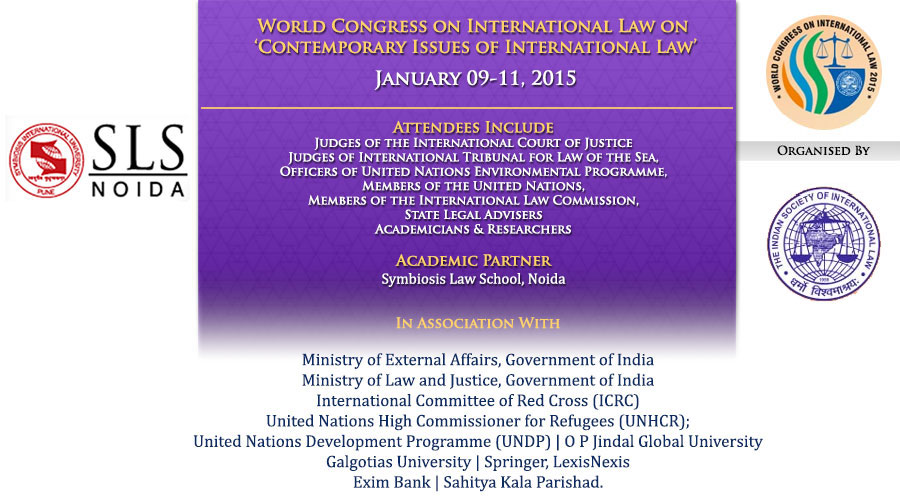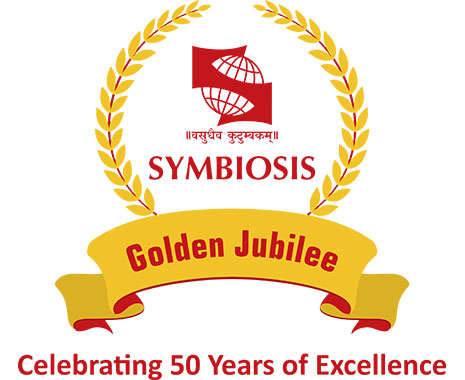World Congress on International Law on ‘Contemporary Issues of International Law’: January 09-11, 2015
ABOUT CONFERENCE
We are delighted to inform you that Symbiosis Law School, NOIDA is invited and honoured to be the ‘Academic Partner’ by the Indian Society of International Law (ISIL) in organisation of World Congress on International Law on “Contemporary Issues of International Law” on January 9-11, 2015.
Other remarkable association of the World Congress include – Ministry of External Affairs, Government of India; Ministry of Law and Justice, Government of India, International Committee of Red Cross (ICRC), United Nations High Commissioner for Refugees (UNHCR); United Nations Development Programme (UNDP); O P Jindal Global University; Galgotias University; Springer, LexisNexis; Exim Bank; Sahitya Kala Parishad.
ISIL was founded in 1959 and was formally inaugurated by Prime Minister Pandit Jawaharlal Nehru. The principal objectives inter alia of the ISIL are to “foster nation wide, the study and development of International Law and to encourage the comparative study of the application of International Law in other States.” In pursuance of its objectives, the ISIL organizes conferences and seminars on international legal issues of contemporary interest. Finally and equally important, it conducts and promotes independent research on issues of international law.
Hon’ble President of IndiaShri Pranab Mukherjeewill inaugurate the World Congress conference.Judge Peter Tomka, President,InternationalCourt of Justice, The Hague;Judge Abdulqawi Ahmed Yusuf, InternationalCourt of Justice, The Hague andHon’ble Justice Shri. Judge Dalveer Bhandari, InternationalCourt of Justice, The Hague and Chairman, Steering Committee will also address the inaugural session.
THE OFFICIAL BANNER

OBJECTIVES OF THE WORLD CONGRESS
The objective is to 'confederate' different national and regional societies and other bodies engaged in promotion of study and spread of awareness of international law under one roof. The idea is to bring together scholars and national and regional international law bodies drawn from diverse countries from different continents, forge a global network of such bodies devoted to international law, and deliberate on contemporary issues of international law as frequently as possible, at least once in every two years. Such get-togethers amongst non-governmental bodies comprising academia, lawyers, diplomats, parliamentarians, policymakers and members of judiciary from different countries, representing a cross-section of International Law academia and practitioners on one platform would provide a continuous framework for exchange of ideas, joint seminars, conferences, workshops, research collaborations between and amongst various national and regional societies, and meeting in some important city in a country willing to host such meetings. Furthermore, this network of international law societies will hopefully and eventually seek to establish The World Society of International Law.
The objective of the Conference is to examine and discuss the contemporary issues of international law, which encompass a variety of topics, WTO and International Trade, Investment Law, Arbitration, Intellectual Property Rights, Technology and Development of International Law, National Implementation of International Law and Other Issues.
WHO CAN ATTEND THE CONFERENCE
In addition to participants from India, the World Congress Conference is to be attended by a large number of delegates from abroad. The potential foreign participants may include –
- Judges of the International Court of Justice
- Judges of International Tribunal for Law of the Sea,
- Officers of United Nations Environmental Programme,
- Members of the United Nations,
- Members of the International Law Commission,
- State Legal Advisers
- Academicians & Researchers
HIGHLIGHTS OF THE CONFERENCE
CONTEMPORARY ISSUES OF INTERNATIONAL LAW
International Law, Treaty Making & World Trade Organization
- Decision Making Process in International Institution
- Immunity of State Officials from Foreign Criminal Jurisdiction
- Anti-dumping
- Agreement on Agriculture
- Trade Facilitation
- Human Rights & Refugee Law
- Private International Law
Technology and Development of International Law
- Intellectual Property Rights (IPR)
- International Environmental Law
- Law of Outer Space
- International Humanitarian Law
- Exploitation of Marine Living and Non-Living Resources
- Foreign Investment & International Taxation
- Civil Aviation and Shipping
- Nuclear Liability

